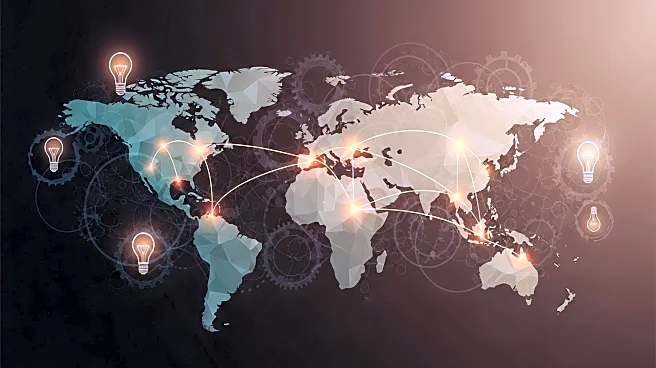What is the story about?
What's Happening?
Turkey has emerged as a key player in facilitating trade between Russia and the global market despite extensive sanctions imposed on Russia. The country has developed a systematic approach to legally conduct business with Russia, benefiting economically from this arrangement. Turkey's diplomatic history with the U.S. and E.U. has been marked by strategic frictions, including its purchase of Russian S-400 missiles and exclusion from the F-35 fighter program. Despite these tensions, Turkey has maintained and strengthened its ties with Russia, engaging in significant projects such as the TurkStream natural gas pipeline and the Akkuyu nuclear plant. Turkey's strategic position allows it to blend and re-export Russian oil products, circumventing sanctions and enabling trade with the E.U.
Why It's Important?
Turkey's role in facilitating Russian trade has significant implications for global energy markets and international diplomacy. By providing a legal pathway for Russian oil and gas exports, Turkey helps sustain Russia's economic activities despite sanctions, impacting global energy supply and prices. This arrangement also highlights Turkey's strategic leverage between Western allies and Russia, allowing it to benefit economically while maintaining diplomatic ties with both sides. The situation underscores the complexities of international sanctions and the challenges in enforcing them, as countries like Turkey find legal loopholes to continue trade. This development may influence future diplomatic and economic strategies among U.S., E.U., and other global stakeholders.
What's Next?
Turkey's continued facilitation of Russian trade may lead to increased scrutiny and pressure from Western allies, particularly the U.S. and E.U., who have expressed concerns over Turkey's business dealings with sanctioned Russian entities. As Turkey navigates its diplomatic relationships, it may face challenges in balancing its economic interests with political alliances. The situation could prompt discussions on revising or tightening international sanctions to address loopholes exploited by countries like Turkey. Additionally, Turkey's actions may influence other nations in the region to adopt similar strategies, potentially reshaping trade dynamics and diplomatic relations in the Mediterranean and beyond.
Beyond the Headlines
Turkey's approach to Russian trade highlights broader ethical and legal questions regarding the enforcement of international sanctions and the role of intermediary countries in global trade. The situation raises concerns about the effectiveness of sanctions as a tool for political leverage and the potential for countries to exploit legal ambiguities for economic gain. Turkey's actions may also reflect a shift in global power dynamics, as countries increasingly prioritize economic interests over traditional alliances. This development could lead to long-term changes in international trade policies and diplomatic strategies, as nations reassess their positions in a rapidly evolving geopolitical landscape.















